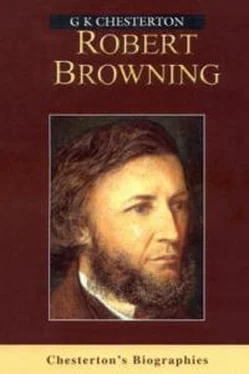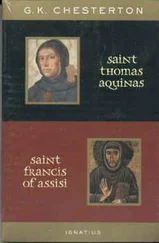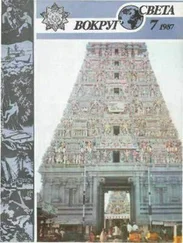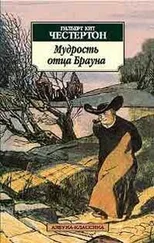Гилберт Честертон - Robert Browning
Здесь есть возможность читать онлайн «Гилберт Честертон - Robert Browning» весь текст электронной книги совершенно бесплатно (целиком полную версию без сокращений). В некоторых случаях можно слушать аудио, скачать через торрент в формате fb2 и присутствует краткое содержание. Год выпуска: 2014, Издательство: epubBooks Classics, Жанр: Биографии и Мемуары, на английском языке. Описание произведения, (предисловие) а так же отзывы посетителей доступны на портале библиотеки ЛибКат.
- Название:Robert Browning
- Автор:
- Издательство:epubBooks Classics
- Жанр:
- Год:2014
- ISBN:нет данных
- Рейтинг книги:5 / 5. Голосов: 1
-
Избранное:Добавить в избранное
- Отзывы:
-
Ваша оценка:
- 100
- 1
- 2
- 3
- 4
- 5
Robert Browning: краткое содержание, описание и аннотация
Предлагаем к чтению аннотацию, описание, краткое содержание или предисловие (зависит от того, что написал сам автор книги «Robert Browning»). Если вы не нашли необходимую информацию о книге — напишите в комментариях, мы постараемся отыскать её.
Robert Browning — читать онлайн бесплатно полную книгу (весь текст) целиком
Ниже представлен текст книги, разбитый по страницам. Система сохранения места последней прочитанной страницы, позволяет с удобством читать онлайн бесплатно книгу «Robert Browning», без необходимости каждый раз заново искать на чём Вы остановились. Поставьте закладку, и сможете в любой момент перейти на страницу, на которой закончили чтение.
Интервал:
Закладка:
But in truth it is very difficult to keep pace with all the strange and unclassified artistic merits of Browning. He was always trying experiments; sometimes he failed, producing clumsy and irritating metres, top–heavy and over–concentrated thought. Far more often he triumphed, producing a crowd of boldly designed poems, every one of which taken separately might have founded an artistic school. But whether successful or unsuccessful, he never ceased from his fierce hunt after poetic novelty. He never became a conservative. The last book he published in his life–time, Parleyings with Certain People of Importance in their Day , was a new poem, and more revolutionary than Paracelsus . This is the true light in which to regard Browning as an artist. He had determined to leave no spot of the cosmos unadorned by his poetry which he could find it possible to adorn. An admirable example can be found in that splendid poem "Childe Roland to the Dark Tower came." It is the hint of an entirely new and curious type of poetry, the poetry of the shabby and hungry aspect of the earth itself. Daring poets who wished to escape from conventional gardens and orchards had long been in the habit of celebrating the poetry of rugged and gloomy landscapes, but Browning is not content with this. He insists upon celebrating the poetry of mean landscapes. That sense of scrubbiness in nature, as of a man unshaved, had never been conveyed with this enthusiasm and primeval gusto before.
"If there pushed any ragged thistle–stalk
Above its mates, the head was chopped; the bents
Were jealous else. What made those holes and rents
In the dock's harsh swarth leaves, bruised as to baulk
All hope of greenness? 'tis a brute must walk
Pashing their life out, with a brute's intents."
This is a perfect realisation of that eerie sentiment which comes upon us, not so often among mountains and water–falls, as it does on some half–starved common at twilight, or in walking down some grey mean street. It is the song of the beauty of refuse; and Browning was the first to sing it. Oddly enough it has been one of the poems about which most of those pedantic and trivial questions have been asked, which are asked invariably by those who treat Browning as a science instead of a poet, "What does the poem of 'Childe Roland' mean?" The only genuine answer to this is, "What does anything mean?" Does the earth mean nothing? Do grey skies and wastes covered with thistles mean nothing? Does an old horse turned out to graze mean nothing? If it does, there is but one further truth to be added—that everything means nothing.
Chapter VII
The Ring and the Book
When we have once realised the great conception of the plan of The Ring and the Book , the studying of a single matter from nine different stand–points, it becomes exceedingly interesting to notice what these stand–points are; what figures Browning has selected as voicing the essential and distinct versions of the case. One of the ablest and most sympathetic of all the critics of Browning, Mr. Augustine Birrell, has said in one place that the speeches of the two advocates in The Ring and the Book will scarcely be very interesting to the ordinary reader. However that may be, there can be little doubt that a great number of the readers of Browning think them beside the mark and adventitious. But it is exceedingly dangerous to say that anything in Browning is irrelevant or unnecessary. We are apt to go on thinking so until some mere trifle puts the matter in a new light, and the detail that seemed meaningless springs up as almost the central pillar of the structure. In the successive monologues of his poem, Browning is endeavouring to depict the various strange ways in which a fact gets itself presented to the world. In every question there are partisans who bring cogent and convincing arguments for the right side; there are also partisans who bring cogent and convincing arguments for the wrong side. But over and above these, there does exist in every great controversy a class of more or less official partisans who are continually engaged in defending each cause by entirely inappropriate arguments. They do not know the real good that can be said for the good cause, nor the real good that can be said for the bad one. They are represented by the animated, learned, eloquent, ingenious, and entirely futile and impertinent arguments of Juris Doctor Bottinius and Dominus Hyacinthus de Archangelis. These two men brilliantly misrepresent, not merely each other's cause, but their own cause. The introduction of them is one of the finest and most artistic strokes in The Ring and the Book .
We can see the matter best by taking an imaginary parallel. Suppose that a poet of the type of Browning lived some centuries hence and found in some cause célèbre of our day, such as the Parnell Commission, an opportunity for a work similar in its design to The Ring and the Book . The first monologue, which would be called "Half–London," would be the arguments of an ordinary educated and sensible Unionist who believed that there really was evidence that the Nationalist movement in Ireland was rooted in crime and public panic. The "Otherhalf–London" would be the utterance of an ordinary educated and sensible Home Ruler, who thought that in the main Nationalism was one distinct symptom, and crime another, of the same poisonous and stagnant problem. The "Tertium Quid" would be some detached intellectual, committed neither to Nationalism nor to Unionism, possibly Mr. Bernard Shaw, who would make a very entertaining Browning monologue. Then of course would come the speeches of the great actors in the drama, the icy anger of Parnell, the shuffling apologies of Pigott. But we should feel that the record was incomplete without another touch which in practice has so much to do with the confusion of such a question. Bottinius and Hyacinthus de Archangelis, the two cynical professional pleaders, with their transparent assumptions and incredible theories of the case, would be represented by two party journalists; one of whom was ready to base his case either on the fact that Parnell was a Socialist or an Anarchist, or an Atheist or a Roman Catholic; and the other of whom was ready to base his case on the theory that Lord Salisbury hated Parnell or was in league with him, or had never heard of him, or anything else that was remote from the world of reality. These are the kind of little touches for which we must always be on the look–out in Browning. Even if a digression, or a simile, or a whole scene in a play, seems to have no point or value, let us wait a little and give it a chance. He very seldom wrote anything that did not mean a great deal.
It is sometimes curious to notice how a critic, possessing no little cultivation and fertility, will, in speaking of a work of art, let fall almost accidentally some apparently trivial comment, which reveals to us with an instantaneous and complete mental illumination the fact that he does not, so far as that work of art is concerned, in the smallest degree understand what he is talking about. He may have intended to correct merely some minute detail of the work he is studying, but that single movement is enough to blow him and all his diplomas into the air. These are the sensations with which the true Browningite will regard the criticism made by so many of Browning's critics and biographers about The Ring and the Book . That criticism was embodied by one of them in the words "the theme looked at dispassionately is unworthy of the monument in which it is entombed for eternity." Now this remark shows at once that the critic does not know what The Ring and the Book means. We feel about it as we should feel about a man who said that the plot of Tristram Shandy was not well constructed, or that the women in Rossetti's pictures did not look useful and industrious. A man who has missed the fact that Tristram Shandy is a game of digressions, that the whole book is a kind of practical joke to cheat the reader out of a story, simply has not read Tristram Shandy at all. The man who objects to the Rossetti pictures because they depict a sad and sensuous day–dream, objects to their existing at all. And any one who objects to Browning writing his huge epic round a trumpery and sordid police–case has in reality missed the whole length and breadth of the poet's meaning. The essence of The Ring and the Book is that it is the great epic of the nineteenth century, because it is the great epic of the enormous importance of small things. The supreme difference that divides The Ring and the Book from all the great poems of similar length and largeness of design is precisely the fact that all these are about affairs commonly called important, and The Ring and the Book is about an affair commonly called contemptible. Homer says, "I will show you the relations between man and heaven as exhibited in a great legend of love and war, which shall contain the mightiest of all mortal warriors, and the most beautiful of all mortal women." The author of the Book of Job says, "I will show you the relations between man and heaven by a tale of primeval sorrows and the voice of God out of a whirlwind." Virgil says, "I will show you the relations of man to heaven by the tale of the origin of the greatest people and the founding of the most wonderful city in the world." Dante says, "I will show you the relations of man to heaven by uncovering the very machinery of the spiritual universe, and letting you hear, as I have heard, the roaring of the mills of God." Milton says, "I will show you the relations of man to heaven by telling you of the very beginning of all things, and the first shaping of the thing that is evil in the first twilight of time." Browning says, "I will show you the relations of man to heaven by telling you a story out of a dirty Italian book of criminal trials from which I select one of the meanest and most completely forgotten." Until we have realised this fundamental idea in The Ring and the Book all criticism is misleading.
Читать дальшеИнтервал:
Закладка:
Похожие книги на «Robert Browning»
Представляем Вашему вниманию похожие книги на «Robert Browning» списком для выбора. Мы отобрали схожую по названию и смыслу литературу в надежде предоставить читателям больше вариантов отыскать новые, интересные, ещё непрочитанные произведения.
Обсуждение, отзывы о книге «Robert Browning» и просто собственные мнения читателей. Оставьте ваши комментарии, напишите, что Вы думаете о произведении, его смысле или главных героях. Укажите что конкретно понравилось, а что нет, и почему Вы так считаете.










